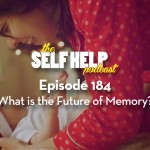The Future of Memory
This week podcast was inspired by a recent research project being carried out at Southern California University. Theodore Berger is developing an extension to the brains memory. In the research, prosthetic implants were connected into the brains of the research subjects. These implants became an extension of the hippocampus. The Hippocampus is the section of the brain where memories are stored.
The implication of the research is, if a person’s memories can be all stored on a memory stick could they then be transferred to someone else’s brain and then experienced as though they were their natural memories? A bit like cut and paste.
Is a memory emotional or factual?
Ed and I got talking about what is a memory. Is a memory factual information or does a memory include emotions. So, when we remember something are we remembering factual information or an emotional interpretation of what was experienced?
The more I think about it the more I realise that memories are emotional not factual. I am reminded about a memory of my father that changed when my sister gave me extra information.
One day, as a preschool child, I opened the kitchen door to see my father backhand me eldest sister across the room. She hit the wall hard and, with her spectacles askew, slid down the wall onto her bottom. I ran and hid under my bed. For me I just experienced my father having another emotionally violent outburst and I was so scared of him I shook with terror.
Information changes memory
Many years later, when I was staying with my sister, we were talking about our father and what problems we had all had with him. I retold the above story, offering it as an example of what a shit he was. My sister laughed. She then explained that what had really happened was that she had been at the cooker and had pulled a pan of boiling water towards her that, as I opened the door, was in the process of falling off the cooker. My father had, energetically, pushed her out of the path of the falling water saving her from a serious scalding.
The effect of this information was that my emotional connection changed. Previously this had been a negative memory proving my own prejudices about my father. The new information now made me review that memory and move it from the negative file to the positive file.
We all see the world from our own point of view
Because we all view the world through our own coloured glasses, that filter holds our prejudices and beliefs; we are all subject to the changing experience as our emotions develop with our life learning.
Regret is seldom productive
Sometimes, when we review memories, we blame or beat ourselves up for things that we either did, or didn’t, do. When we do this we are acknowledging that our emotional connections to that memory have now developed or changed. It is often a case of, “if I knew then what I know now…” I would have acted differently. Yet the reality is that if we were back in the same situation with the same emotional and mental resources we would make the same decisions because that was what made sense to us at that time. The residue of the changing emotional attachments to specific memories can be experienced in the present as regret, loss, guilt and so on, even when these feelings were never there at the time.
Memory is selective
When we remember the past we are selective due to our needs in the current moment. Say, for example, if a gang of us are sat around talking about funny times then we all begin to remember or recall funny events that we can then begin to share. If on the other hand we begin to talk about sad, angry, courageous or whatever situation our memory mechanism selectively recall memories that fit with the current conversation in the present moment.
Sensory smell
Recall can be triggered by sensory input such as smell, taste, touch, vision, colour, and so on. Pieces of music, paintings, views and scenes can have the same effect. When we become aware of the way that we view these memories we begin to see that our connections between these sensory inputs and memory are really emotional.
The bias of memory
I guess that last thing that raps it up for memory and the biased way that we experience the world. If a group of people witness the same event and then afterwards are asked to describe what they have experienced then their descriptions will vary, often quite a lot.
So, if we were to transfer the factual memories held in the hippocampus from one person to another we might be able to share what was experienced by our senses but we would never be sharing the emotional feeling that are connected to those memories. The person who received our memories would, in their turn, overlay their own emotions and feelings on those memories. There fore their interpretations would be completely different to ours.
On that basis I suggest that this research project is destined to fail. What do you think?
Take care, and remember to be happy
Sean x


Trackbacks & Pingbacks
[…] Sean wrote a blog post on this subject. Have a read… […]
Leave a Reply
Want to join the discussion?Feel free to contribute!